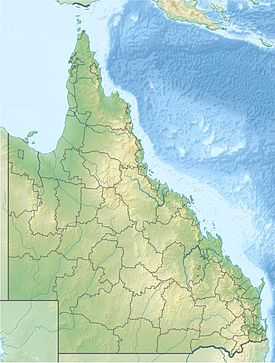Cape Pallarenda Conservation Park
| Cape Pallarenda Conservation Park Queensland | |
|---|---|
|
View of Cape Pallarenda Conservation Park, with parts of the Townsville Airport and RAAF Base Townsville visible in the foreground | |
 Cape Pallarenda Conservation Park | |
| Nearest town or city | Townsville |
| Coordinates | 19°11′30″S 146°46′14″E / 19.19167°S 146.77056°ECoordinates: 19°11′30″S 146°46′14″E / 19.19167°S 146.77056°E |
| Established | 1994[1] |
| Area | 0.44 km2 (0.2 sq mi)[1] |
| Managing authorities | Queensland Parks and Wildlife Service |
| Website | Cape Pallarenda Conservation Park |
The Cape Pallarenda Conservation Park is a protected conservation park located 10 kilometres (6.2 mi) north-east of Townsville in the Far North region of Queensland, Australia. The 44-hectare (110-acre) regional park is located adjacent to the suburb of Pallarenda.[2][3]
Attractions
There are several walking tracks on Cape Pallarenda. One of them passes two Second World War searchlight emplacements, and leads to the isolated and scenic Shelley Beach. Another path leads to a moving graveyard and memorial for 13 Vietnamese immigrants who died in August 1920 during a meningitis outbreak while interned at the (now defunct) Cape Pallarenda Quarantine Station.[4][5]
Pallarenda Park also has a boat ramp that provides direct access to the beach, and a permanent stinger enclosure for swimming.
History
Cape Pallarenda was named in 1864 by Lieutenant G. P. Heath during his survey of Cleveland Bay. It is believed that the name is of Aboriginal origin, although the exact meaning is not known.
Pallarenda Park was transformed during World War II into a military hospital. The 500 bed, 2/14 Army General Hospital scattered along the sandy foreshore at Pallarenda, Townsville received many casualties, most from New Guinea.[6]
Controversy
Consideration is being given to a housing development within the park boundaries, which has been met by opposition by local residents.
See also
References
- ↑ 1.0 1.1 "Cape Pallarenda Regional Park: Park management". Department of National Parks, Recreation, Sport and Racing. Government of Queensland. 2014. Retrieved 7 September 2014.
- ↑ "Cape Pallarenda Conservation Park (entry 39403)". Queensland Place Names. Queensland Government. Retrieved 6 December 2013.
- ↑ "Cape Pallarenda Conservation Park". Queensland Government. Retrieved 6 December 2013.
- ↑ "Cape Pallarenda Quarantine Station (former) (entry 16869)". Queensland Heritage Register. Queensland Heritage Council.
- ↑ The Vietnamese of Cape Pallarenda: the First Vietnamese in Australia by Professor Desmond Cahill
- ↑ Parks Services - Townsville City Council
External links
- Cape Pallarenda Conservation Park map (PDF) (PDF Map). Queensland Parks and Wildlife Service, Department of National Parks, Recreation, Sport and Racing, Queensland Government. October 2012.
